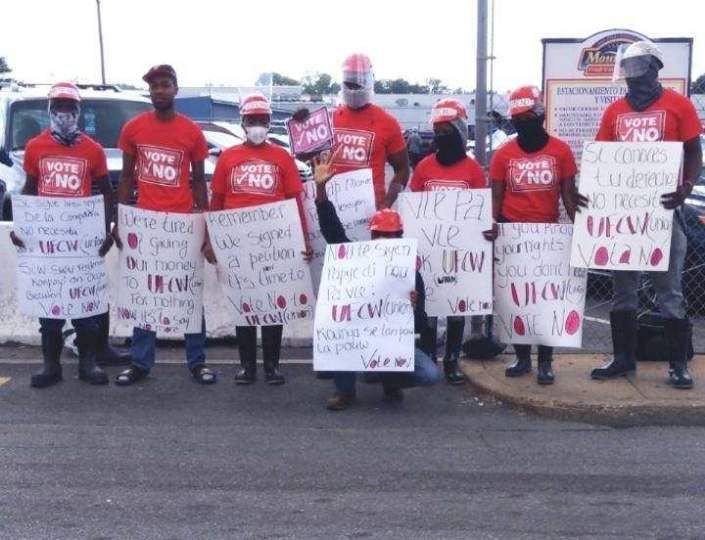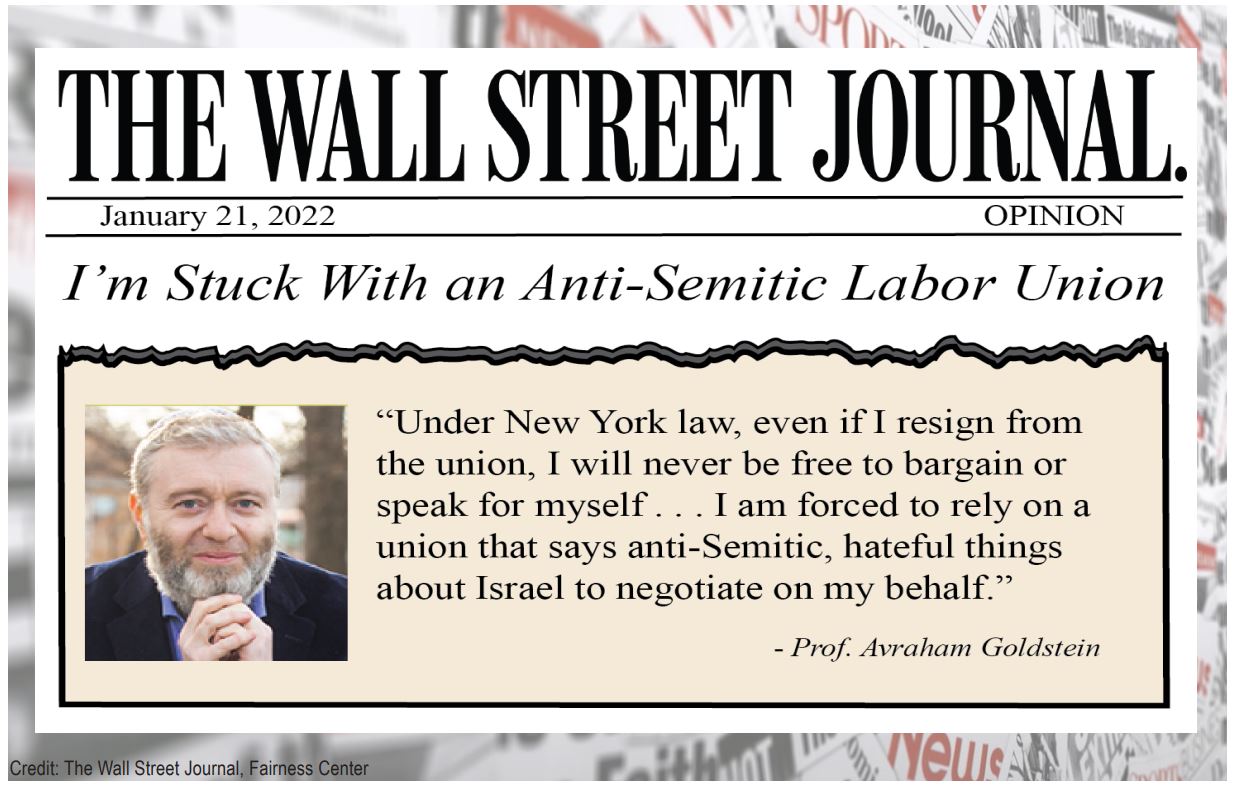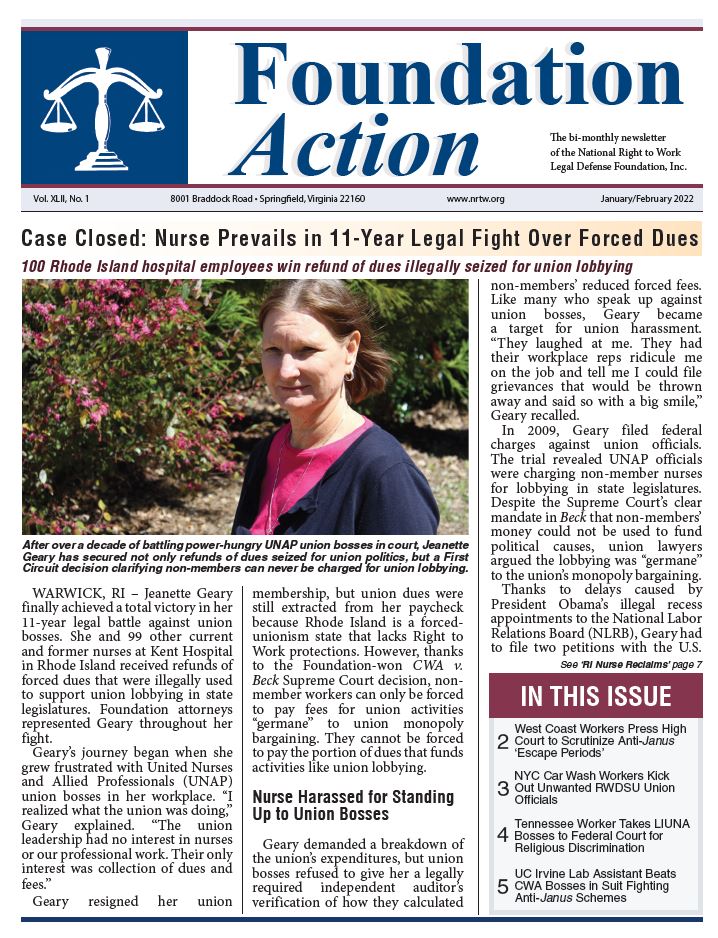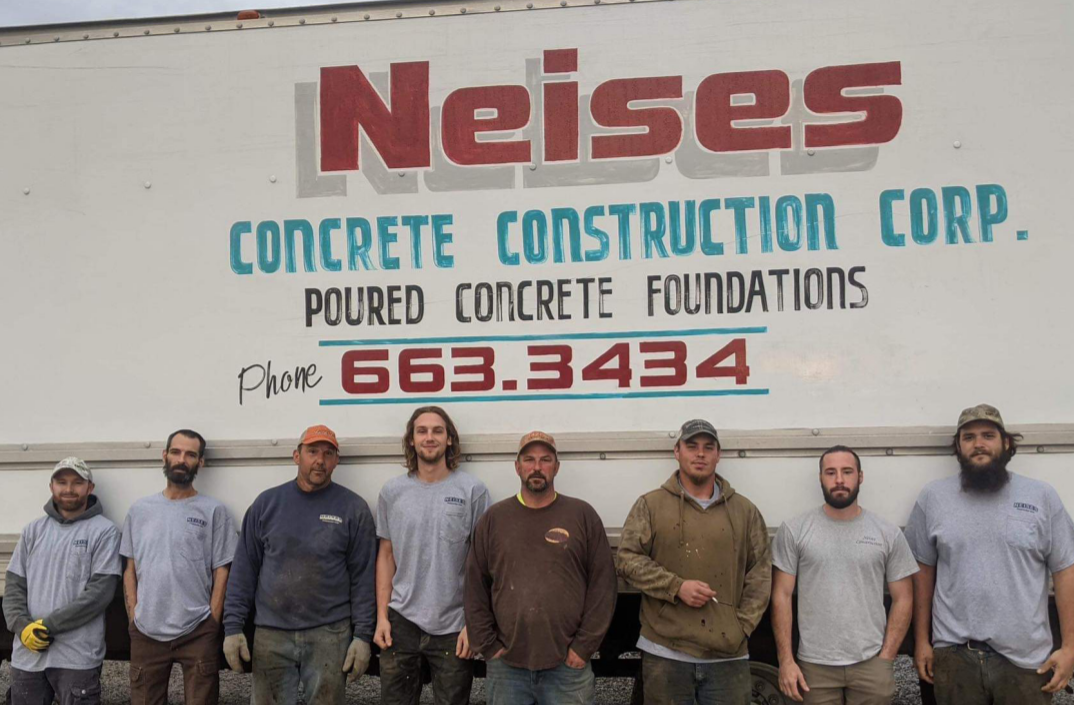Boeing Technician Files Federal Lawsuit Against Machinists Union Over Illegal Forced Dues Demands
Instead of reducing nonmember worker’s payments in accordance with Supreme Court precedent, union bosses charged him arbitrary higher amount
Seattle, WA (May 24, 2022) – With free legal aid from the National Right to Work Legal Defense Foundation, Seattle Boeing technician Don Zueger is suing International Association of Machinists (IAM) union officials in federal court for violating his right to refrain from paying for unwanted union activities.
Zueger, who is not a member of the IAM union, is defending his right under the Foundation-won 1988 CWA v. Beck U.S. Supreme Court decision, in which the Court ruled that union officials cannot charge full union dues to objecting private sector workers who have abstained from formal union membership. Under Beck, union officials can only charge union nonmembers “fees” which exclude expenses for things like union political activities.
Because Washington State lacks Right to Work protections for its private sector workers, nonmembers like Zueger can be forced to pay the reduced amount under Beck as a condition of keeping their jobs. In Right to Work states, in contrast, union membership and all union financial support are strictly voluntary.
IAM Officials Continue to Overcharge Worker in Violation of His Rights
According to Zueger’s lawsuit, filed in the U.S. District Court for the Western District of Washington, he submitted a request to IAM union officials in February resigning his union membership and asking for his dues payments to be reduced under Beck.
Zueger’s lawsuit reports that IAM officials’ response to his Beck request claimed that, under IAM’s nationwide policy, the portion of union dues he is required to pay is based on averages of selected audits that in each case include nine other local and district IAM affiliates. This means the forced union fee amount is not calculated using the actual amounts determined in the audits of the local and district IAM affiliates that Zueger is required to fund as a condition of employment. Unsurprisingly, this resulted in Zueger’s dues reduction being significantly less than it would have been had union officials only used the audits for the district and local affiliates Zueger is forced to fund.
According to his lawsuit, union officials are still demanding from Zueger dues in excess of the amount Beck permits. The lawsuit seeks to force IAM union bosses to return all money demanded in violation of Beck and to properly reduce his future union payments in accordance with Beck.
Workers Should Be Wary of Illegal Union Dues Schemes as Union Political Activity Increases
Zueger’s lawsuit comes after union bosses spent near-record sums on politics during the 2020 election cycle. A report by the National Institute for Labor Relations Research (NILRR) released in 2021 revealed that union officials’ own Department of Labor filings show about $2 billion in political spending during the 2020 cycle, primarily from dues-stocked union general treasuries. Moreover, other estimates strongly suggest that actual union spending on political and lobbying activities actually topped $12 billion in 2019-2020.
“It doesn’t take a rocket scientist to figure out when union officials are trying to strong-arm employees into subsidizing union activities, including politics, against their will. IAM officials’ nonmember dues scheme doesn’t pass the smell test,” commented National Right to Work Foundation President Mark Mix. “While we’re proud to help Mr. Zueger defend his Beck rights, ultimately no American worker should be forced to pay fees determined by the whims of union officials simply in order to keep their jobs.”
“This case shows why Right to Work laws are needed nationwide to ensure that the decision to join or financially support a union is strictly a matter of each individual worker’s own conscience. Workers should be especially aware of attempts by union officials to force them to fund union activities as union political activity heats up in advance of this year’s elections,” Mix added.
Brockton Visiting Nurse Staff Petition to Remove Unwanted SEIU Officials from Workplace
Mail-in ballots must be returned by close of business on June 2, 2022
Brockton, MA – Home healthcare staff at Brockton Visiting Nurse in Brockton, Massachusetts have filed a petition seeking the removal of Service Employees International Union Local 1199 from their workplace. The workers’ decertification petition was filed with the National Labor Relations Board (NLRB) Region 1 with free legal representation from National Right to Work Legal Defense Foundation staff attorneys.
Brockton Visiting Nurse employee Ann Pircio filed the decertification petition for her coworkers who want to oust the disliked union. Massachusetts is not a Right to Work state, meaning all workers in a unionized workplace can legally be required to pay dues or fees to a union as a condition of keeping their jobs. If the workers’ vote is upheld by the NLRB, SEIU union officials will be stripped of their monopoly “representation” powers used to impose forced union dues.
Under federal law, when at least 30% of workers in a bargaining unit sign a petition seeking the removal of union officials’ monopoly bargaining powers, an NLRB-conducted secret ballot vote whether to remove the union is triggered. If a majority of workers casting valid ballots do not vote for the union, the union is stripped of its government-granted monopoly “representation” powers. Those powers let union officials impose contracts on all workers in the workplace, even workers who are not union members and oppose the union.
The election for Brockton Visiting Nurse staff is scheduled as a mail-in vote. All ballots will be mailed by the NLRB to eligible voters who must mail back their votes. Workers’ votes must arrive by close of business on June 2, 2022, to be counted.
National Right to Work Foundation staff attorneys have recently assisted workers in numerous successful decertification efforts across the nation, including for workers in Indiana, Illinois, and New Jersey. Foundation-backed reforms to the rules for decertification elections that the NLRB adopted in 2020 have curtailed union officials’ abuse of so-called “blocking charges” used to delay or block workers from exercising their right to decertify a union. Such charges are often based on unproven allegations made against an employer, completely unrelated to workers’ desire to free themselves of the union.
“Workers everywhere should know they can turn to the Foundation for free legal aid to help enforce their right to free themselves from unwanted union so-called ‘representation,” commented National Right to Work Foundation President Mark Mix. “No matter the outcome of this decertification vote, the many workers at Brockton who are opposed to the union should never have been required to fund the activities of union officials with whom they want nothing to do. That is why Massachusetts workers deserve the protection of a Right to Work law that makes union financial support strictly voluntary.”
Workers Sue National Labor Relations Board Over Rule Blocking Them from Exercising Right to Remove Union
Lawsuit: School bus drivers’ petition for a decertification election was blocked under “settlement bar” doctrine in violation of the National Labor Relations Act
Pittsburgh, PA (November 28, 2018) – With free legal assistance from National Right to Work Foundation staff attorneys, two Pennsylvania school bus drivers have filed a federal lawsuit against the National Labor Relations Board (NLRB) after the Board blocked their petition to hold an election to remove an unwanted union from their workplace.
Marcia Williams and Karen Wunz, employed by Krise Transportation, filed their complaint at the U.S. District Court for the Western District of Pennsylvania. Their lawsuit challenges the NLRB’s “settlement bar” rule, which blocks employees in a union monopoly bargaining unit from holding a secret ballot election to decertify the union before an NLRB-mandated period of time after the settlement agreement date. The complaint asserts that the rule violates the workers’ rights under the National Labor Relations Act (NLRA).
In March 2018, Krise and Teamsters Local 397 entered into a settlement agreement in an unfair labor practice case. The agreement included a clause that barred workers from challenging Teamsters Local 397 union officials’ monopoly bargaining status for a year after the officials’ first bargaining session with Krise. Williams and Wunz were not parties to the agreement.
In May 2018, Williams filed a petition with the NLRB to decertify Teamsters Local 397. Out of the total 28 Krise employees, 24 employees signed the petition to oppose union officials’ representation. However, the NLRB Regional Director blocked their decertification petition using the “settlement bar” rule. Williams requested that the NLRB review the Regional Director’s decision, but the NLRB upheld the dismissal and blocked the employees’ decertification petition.
Williams and Wunz are represented free of charge by Foundation staff attorneys in their attempt to free themselves and their co-workers from unwanted Teamsters union “representation.” Their complaint explains that the NLRA requires the Board to investigate any petition in which an employee alleges that a union no longer commands a majority of the workers’ support, and that if a question of representation exists the Board must direct a secret ballot election.
The complaint alleges that the NLRB’s “settlement bar” rule conflicts with the clear text and plain meaning of the NLRA, as it blocks Williams, Wunz, and their coworkers from raising a question concerning representation and forces them to submit to the monopoly bargaining privileges of a union they oppose. Foundation staff attorneys argue that nothing in the NLRA grants the Board the authority to issue a rule barring employees even for a “reasonable time” from raising a question concerning representation, “let alone a rule based merely on the employer’s settlement of unfair labor practice charges to which the employees were not parties.”
Williams and Wunz ask the court to declare the NLRB’s “settlement bar” rule a violation of the Board’s Congressionally-delegated authority and to order the Board to move forward with their decertification petition.
“The National Labor Relations Act is premised on union officials only being granted monopoly bargaining status when they have the support of a majority of the workers they claim to represent. Yet inexplicably the NLRB has concocted several rules that undermine the Act by blocking workers from voting out unwanted representation,” commented Mark Mix, president of the National Right to Work Foundation. “Such doctrines have been restricting workers’ voices for far too long. Ms. Williams and Ms. Wunz are standing up to challenge the Board’s union boss-friendly practices, and the Foundation is proud to join them to challenge this policy that directly contradicts their rights under federal labor law.”











